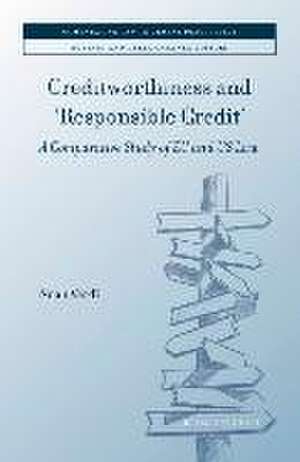Creditworthiness and 'Responsible Credit': A Comparative Study of EU and US Law: Comparative Law in Global Perspective, cartea 2
Autor Noah Vardien Limba Engleză Hardback – 10 aug 2022
Preț: 696.72 lei
Preț vechi: 849.65 lei
-18% Nou
Puncte Express: 1045
Preț estimativ în valută:
133.34€ • 137.74$ • 110.97£
133.34€ • 137.74$ • 110.97£
Carte indisponibilă temporar
Doresc să fiu notificat când acest titlu va fi disponibil:
Se trimite...
Preluare comenzi: 021 569.72.76
Specificații
ISBN-13: 9789004522909
ISBN-10: 9004522905
Pagini: 286
Dimensiuni: 155 x 235 mm
Greutate: 0 kg
Editura: Brill
Colecția Brill | Nijhoff
Seria Comparative Law in Global Perspective
ISBN-10: 9004522905
Pagini: 286
Dimensiuni: 155 x 235 mm
Greutate: 0 kg
Editura: Brill
Colecția Brill | Nijhoff
Seria Comparative Law in Global Perspective
Notă biografică
Noah Vardi, Ph.D. (2005), University of Verona, is Associate Professor of Comparative Law at the Roma Tre University. Her research focuses on European private law, financial markets, banking and payment systems, and the law of money and cryptocurrencies. Her publications include the monograph The Integration of European Financial Markets: The Regulation of Monetary Obligations (Routledge, 2010).
Cuprins
AcknowledgmentsI
1 Introduction: Creditworthiness and ‘Responsible Credit’
Introduction
1.1 Defining ‘Responsible Credit’
1.2 Responsible Credit and the Global Financial Crisis
1.3 Profiles of Relevance of Responsible Credit
1.4 Creditworthiness
1.5 Caution and Criticisms
1.6 Methodology
1.7 Structure of the Book
2 Creditworthiness Assessment as a Macroprudential Duty
Introduction
2.1 Responsible Credit as a Macroprudential Duty: The Duty of Creditworthiness Assessment in Banking Regulation
2.2 Credit Assessments and Credit Rating
2.3 A Few Final Observations: Inferences from the Comparison of Regulatory Choices and Issues Surrounding a Hypothetical ‘Right to a Creditworthiness Assessment’
3 Creditworthiness for Individuals: Methodologies and Legal Issues
Introduction
3.1 Creditworthiness Assessment and Credit Reporting
3.2 Data Protection and Antidiscrimination: Comparative Legal Issues
3.3 Small Business Lending and Credit Scoring
3.4 Comparative Overview and Conclusive Remarks on Credit Scoring and Responsible Lending
4 Creditworthiness Assessment and Other Contractual Duties as Tools of ‘Responsible Credit’: the Case of Consumer Loans
Introduction
4.1 Creditworthiness Assessment in Consumer Credit Contracts and Mortgage Loan Contracts
4.2 Effects of the ‘Responsible Lending’ Provisions on Contract Law
4.3 Instruments for the Enforcement of ‘Responsible Credit’ Provisions
4.4 A Few Conclusive Comparative Remarks
5 Access to Credit and Responsible Lending
Introduction
5.1 The ‘Democratization of Credit’
5.2 Access to Credit as a Policy for Consumers and the Problem of Financial Exclusion
5.3 Access to Credit as a Right? Theorizing ‘Due Process’ in Access to Credit
5.4 Access to Credit and the Right to Housing
5.5 Responsible Credit as a Protective Duty and a Tool for Inclusion
Bibliography
1 Introduction: Creditworthiness and ‘Responsible Credit’
Introduction
1.1 Defining ‘Responsible Credit’
1.2 Responsible Credit and the Global Financial Crisis
1.3 Profiles of Relevance of Responsible Credit
1.4 Creditworthiness
1.5 Caution and Criticisms
1.6 Methodology
1.7 Structure of the Book
2 Creditworthiness Assessment as a Macroprudential Duty
Introduction
2.1 Responsible Credit as a Macroprudential Duty: The Duty of Creditworthiness Assessment in Banking Regulation
2.2 Credit Assessments and Credit Rating
2.3 A Few Final Observations: Inferences from the Comparison of Regulatory Choices and Issues Surrounding a Hypothetical ‘Right to a Creditworthiness Assessment’
3 Creditworthiness for Individuals: Methodologies and Legal Issues
Introduction
3.1 Creditworthiness Assessment and Credit Reporting
3.2 Data Protection and Antidiscrimination: Comparative Legal Issues
3.3 Small Business Lending and Credit Scoring
3.4 Comparative Overview and Conclusive Remarks on Credit Scoring and Responsible Lending
4 Creditworthiness Assessment and Other Contractual Duties as Tools of ‘Responsible Credit’: the Case of Consumer Loans
Introduction
4.1 Creditworthiness Assessment in Consumer Credit Contracts and Mortgage Loan Contracts
4.2 Effects of the ‘Responsible Lending’ Provisions on Contract Law
4.3 Instruments for the Enforcement of ‘Responsible Credit’ Provisions
4.4 A Few Conclusive Comparative Remarks
5 Access to Credit and Responsible Lending
Introduction
5.1 The ‘Democratization of Credit’
5.2 Access to Credit as a Policy for Consumers and the Problem of Financial Exclusion
5.3 Access to Credit as a Right? Theorizing ‘Due Process’ in Access to Credit
5.4 Access to Credit and the Right to Housing
5.5 Responsible Credit as a Protective Duty and a Tool for Inclusion
Bibliography





